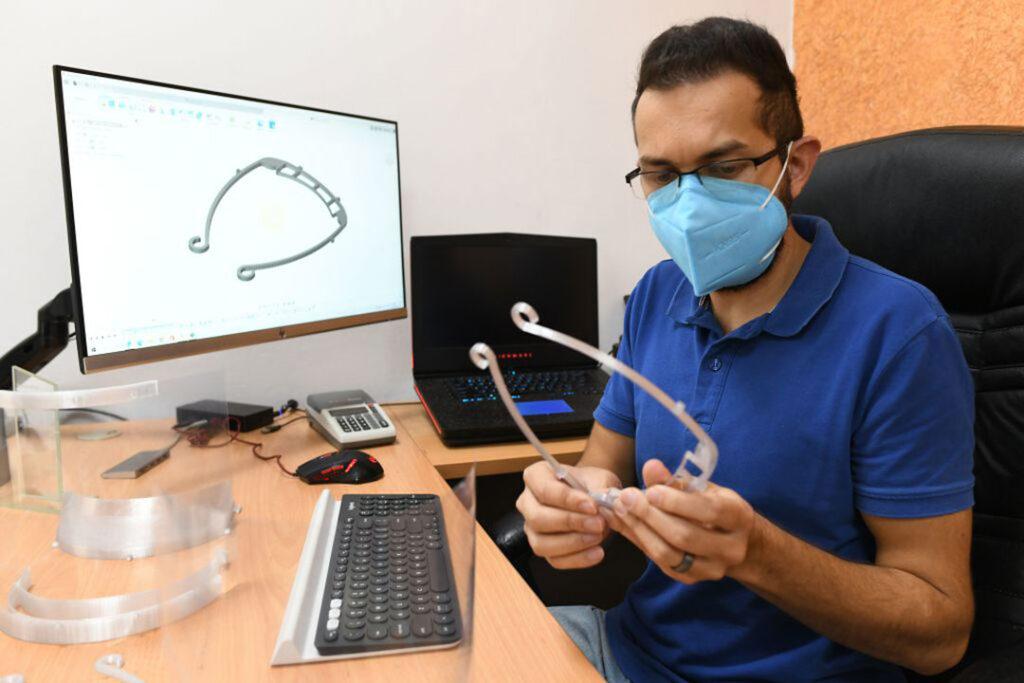ADF STAFF
As Africa fights the COVID-19 pandemic, health and medical officials wield an increasingly powerful weapon: digital technology.
The combination of increasing internet connections and spreading computer- and smartphone-based technology has brought the most current COVID-19 data into Africa’s research labs. It also has allowed for private-sector innovations such as contact-tracing phone apps.
“The COVID-19 pandemic has made clear the urgency for the continent to accelerate these efforts,” said Dr. Monde Muyangwa, Africa program director for the Wilson Center, during a recent conference discussing COVID-19’s effect on technology in Africa.
Private companies and venture capitalists have begun investing in technology — such as digital currency in Kenya and mobile phone-based banking in Nigeria — aimed at alleviating the economic impact of lockdowns and other restrictions set in place to stop the spread of COVID-19.
Meanwhile, Rwanda has made strides to level the digital playing field in the time of COVID-19 but with an eye toward the future.
“What we’ve been doing is to put in place a policy and regulatory framework which fosters access, which looks at affordability, but also availing spectrum to all these operators at affordable prices,” said Paula Ingabire, Rwanda’s minister of information and communications technology and innovation, speaking at a World Bank panel.
The panel was discussing the Digital Moonshot, a $100 billion project launched by the African Union to spread broadband internet across the continent by 2030.
Ingabire said Rwanda’s leadership wants the country to become a testing ground for new digital technologies — in her words, “a proof-of-concept hub.”
In Kenya, Ultra Red Technologies uses digital 3D printing to create face shields for medical workers. Uganda’s mTrac medicine-supply mobile tracking system, a public-private partnership, lets health workers report drug shortages by text message. Ghana was the first country to adopt the AU’s PanaBIOS mobile software that tracks crowds and helps users certify their COVID-19 status at border crossings.
Digital connections also have brought Africa’s research laboratories onto the front lines of the search for a COVID-19 vaccine or treatment. Thanks to high-speed internet connections in major cities, researchers in Dakar, Addis Ababa, Cape Town and beyond can share key findings with their colleagues in Europe, Asia and the Americas, making the search for a cure a truly global collaboration, according to Dr. Matshidiso Moeti, head of the World Health Organization’s Africa Regional Office in Brazzaville, Republic of the Congo.
“Networks have ended the isolation of African scientists and researchers,” Meoli Kashorda, director of the Kenya Education Network, told the United Nation’s African Renewal magazine recently. “You now have access to information from the more developed countries, and this is changing the way people think.”
But the pandemic also has highlighted the digital challenges that still exist in many countries, Muyangwa said.
In many parts of Africa, internet access is growing slower than mobile phone access. Labyrinthine government regulations complicate the development of new technologies, and landlocked countries have more difficulties than their coastal neighbors in getting connections to undersea cables. Telecommunications services also remain more expensive in Africa than elsewhere.
“There is a tremendous need to build fiber optic networks not just in urban areas, but in rural areas,” Nicolai Beckers, CEO of BBM & Partners Telecoms Advisors and former CEO of Ooredoo Algerie, told Business Africa. “The demand from the people is clearly there, but the supply is clearly lacking.”
For some, such as Lanre Kolade, CEO of Kenya-based CSquared telecommunications company, waiting for the Digital Moonshot to fulfill its 2030 goal is too long.
“We need to do it now,” he told the World Bank panel. “It needs to be open access. We are going to be digitally colonized in Africa if we do not do things now.”

